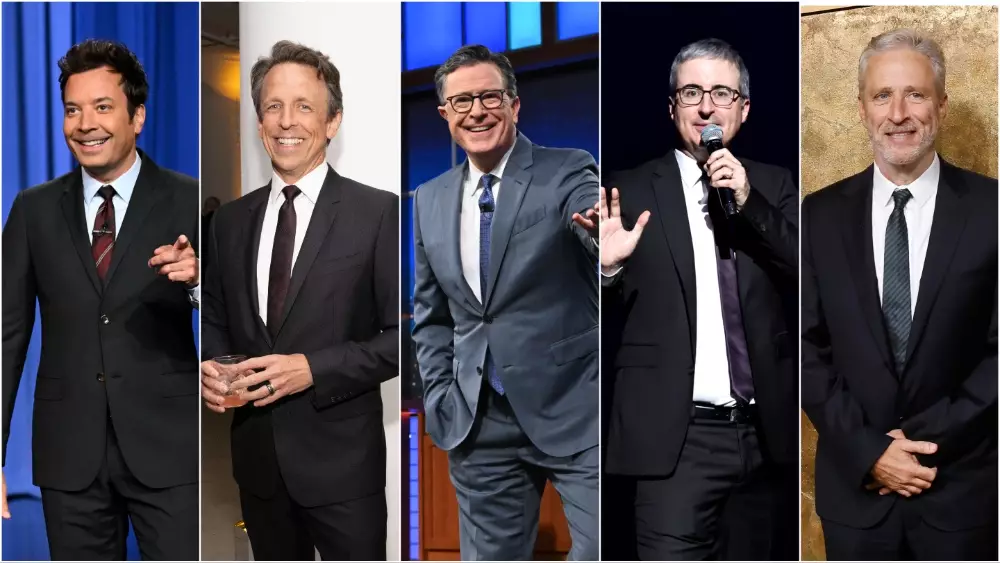The recent cancellation of *The Late Show with Stephen Colbert* signals more than just a shift in programming — it reflects an unsettling upheaval within the landscape of late-night entertainment. Traditionally, late-night shows have served as cultural barometers, blending comedy, politics, and celebrity, fostering a sense of continuity and cultural relevance. When a flagship program like Colbert’s is suddenly shuttered “for financial reasons,” it raises a critical question: is this industry fragmenting beneath the weight of corporate austerity? Such a move doesn’t merely eliminate a TV show; it dismantles a vital forum for societal discourse, comedy, and political satire.
This decision exposes how fragile the commercial foundations of even the most popular content have become. The late-night genre, long anchored by personalities that viewers trust, is now vulnerable to economic short-sightedness. As advertisers prioritize immediate measurable ROI over cultural influence, the essence of political comedy risks becoming collateral damage. The cancellation may shift the power dynamic, making space for more sanitized, profit-driven content, effectively silencing voices that challenge power structures, no matter how popular or influential.
Celebrity Solidarity: A Reflection of Industry Ties and Loyalty
The solidarity demonstrated by Colbert’s peers—Jimmy Fallon, Seth Meyers, Jon Stewart, Andy Cohen, and others—was remarkable, yet revealing. Their appearances at Colbert’s show weren’t purely celebratory; they underscored a shared understanding of the precarious position late-night hosts occupy within a corporate media landscape driven by financial calculus. Their collective presence is a testament to the close-knit nature of this industry, which often functions more like a fraternity than a traditional workplace.
The fact that these luminaries turned out en masse suggests a deeper recognition: the decline of one major show portends the erosion of the genre itself. When Stewart, a former boss and a revered voice of reason, publicly joins the chorus of support, it emphasizes that these professionals view the cancellation not just as a personal loss but as a potential harbinger of broader cultural upheaval. Their unity signals an industry grappling with what it means to maintain integrity and influence when economic pressures threaten to drown out critical voices.
The Subtle Power of Satire and Cultural Commentary Under Threat
One of the most compelling elements of the article is the symbolic act of comedy and satire—performing Coldplay’s hit song, referencing scandals, and the humorous manipulation of corporate letters—all serve as a resistance to the oppressive forces of corporate control. The parody of the letter signed by “the Paramount family of global entertainment properties and A.I. weapons systems” exemplifies the modern battle: entertainment companies increasingly prioritize automation and artificial intelligence over human creative input.
This satirical act illustrates how comedy remains a vital form of societal critique. When Colbert and others mock the machinery of corporate interests, they highlight an industry at risk of losing its voice of dissent. The joke about the network losing “$40 million to $50 million,” despite the song’s popularity, reveals the absurdity of valuing profits over cultural significance. Such acts of defiance are crucial in preserving the independence and edginess of late-night satire, which otherwise might be sacrificed on the altar of profit.
The Industry’s Future: From Cultural Pillars to Corporate Assets
The broader implications of this upheaval point us toward an uncomfortable possibility: traditional late-night broadcasts are becoming disposable assets in an era increasingly dictated by AI, algorithms, and corporate interests. The mention of “A.I. weapons systems” signing the letter alludes to a future where creative content is curated or even generated by machines, stripping away the human element that has historically made late-night comedy relevant and sharp.
This move towards automation and profit-driven content risks turning cultural institutions into interchangeable commodities. The cultural significance of late-night television extends beyond entertainment; it actively shapes public opinion and reflects societal moods. When such platforms are reduced to-cost centers, the impact on political discourse and social reflection could be profound. It paves the way for a future where entertainment is sanitized, less daring, and increasingly devoid of the critique that has made late-night shows a vital part of democracy.
—
The landscape of late-night television is at a crossroads. As corporate interests tighten their grip, the industry faces a challenge: can it preserve its soul amidst relentless economic pressures? The fallout from Colbert’s cancellation underscores an industry grappling with its identity, its financial sustainability, and its cultural relevance. This isn’t just about a show going off the air; it’s about who will control the narrative and how society will continue to engage with political and social issues through comedy. The industry must reckon with whether it will remain a voice of dissent or become just another branch of corporate entertainment.
